10 Startups That Are Helping To Fight Covid-19 In The Uk
In times of crises, innovation is crucial for enabling our public health systems, businesses, and societies to adapt to new realities. Thanks to the hard work of the startups rising up to the challenges of our times and pushing the boundaries of healthcare and technology, we are better able to cope with this global pandemic.
The Singapore Week of Innovation and TeCHnology (SWITCH), happening from 7-10 December 2020, is the one-stop platform for global startups, investors, researchers and ecosystem players to explore innovation opportunities. This is where you can discover up-and-coming startups and the latest inventions from all over the world.
We have collaborated with our conference content partner, UK Department for International Trade (DIT UK), to identify ten exciting startups in the UK to keep an eye on during the global COVID-19 pandemic—and beyond.
Qure.ai
Qure.Ai, an Artificial Intelligence (AI) healthcare startup, applies deep learning technology to radiology exams for medical imaging professionals, generating automated interpretations of the scans. The result is faster diagnoses and speedier treatment times.
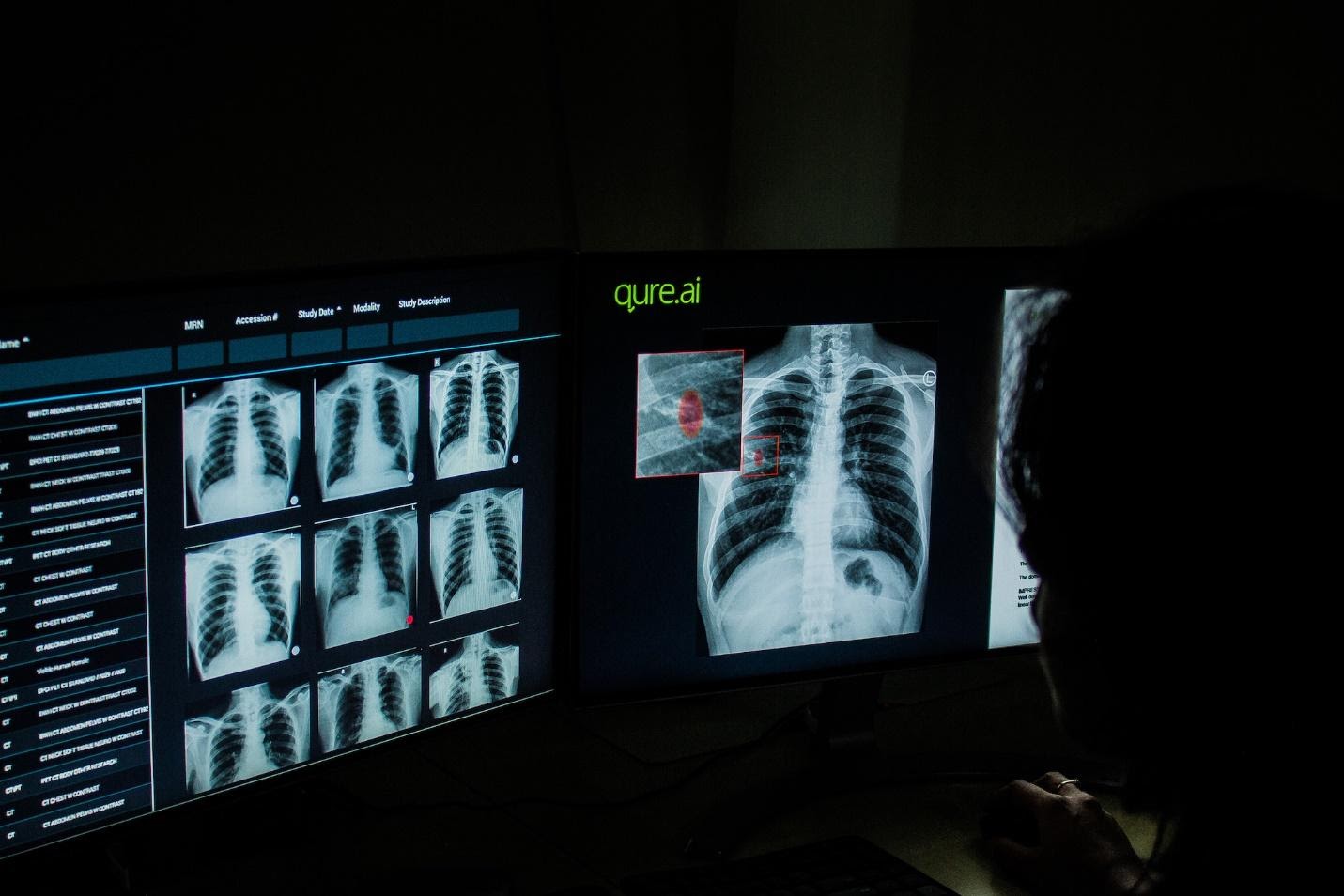
Qure.Ai has tapped on their experience in tackling tuberculosis (TB) to develop qXR to fight COVID-19. With new enhancements, using a combination of the location, size and type of abnormalities observed by the algorithm, to their existing chest X-ray automation and interpretation solution, qXR can classify patients as High, Medium or Low risk for COVID-19. This enables healthcare workers to screen COVID-19 patients who require further testing, and to monitor patients’ progress. This can help prioritise who needs to be tested and who needs to self-isolate.
qXR can also help objectively track disease progression by quantifying the extent of lung infected, which can help measure the response to different therapeutic approaches. This could help optimise treatment plans for patients at different stages of COVID-19.
The startup has also developed qSCOUT, an app-based solution for frontline healthcare providers to carry out contact tracing and remote triaging of COVID-19 patients. qSCOUT enables smartphone-based registration of patients and their contacts using an integrated telehealth service. The app’s embedded AI allows for the mapping of hotspots for door-to-door contact tracing, thus optimising supply chain and test kit distribution for government authorities and healthcare workers.
Patchwork
Patchwork was founded by healthcare workers and managers who have personally experienced the pressures of temporary staffing issues—safe staffing levels and getting staff to the right places is key. Marrying their personal experiences in and knowledge of the sector with cutting-edge technology, they have developed a COVID-19 bank solution.
Patchwork has an existing partnership with the National Health Service (NHS), offering its tech-enabled staff bank service, a wide network of locum clinician who use the app to connect with staff banks directly, and a partnership with the British Medical Journal (BMJ) to reach over 75,000 clinicians.
During this crisis, Patchwork started offering all NHS Trusts free access to its COVID-19 bank solution to manage temporary staffing requirements at scale.
They have thousands of locum healthcare workers on their app, accessing functions like on-demand shift bookings, electronic timesheets, shift notifications, and even tracking financial wellness. The employers’ hub offers vacancy management, financial control, instant notifications for new applications, and integrated electronic payments for ease of use. Their solution automates all necessary processes, saving both time and money.
FarmaTrust
FarmaTrust is a UK-based Artificial Intelligence (AI) and blockchain company active in the medical supply chain industry since 2017. FarmaTrust combines its expertise in blockchain and AI to ensure the integrity of pharmaceutical supply chains during the COVID-19 pandemic.
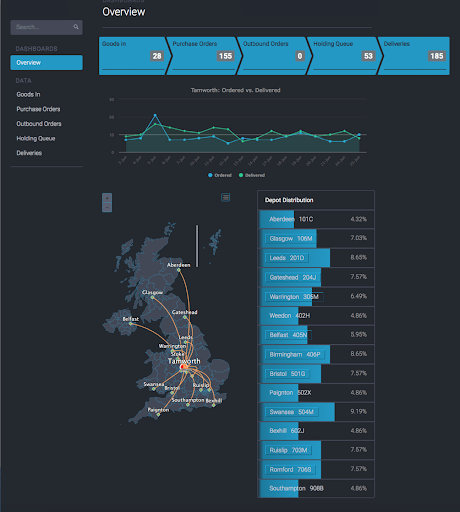
During the pandemic, poor traceability and provenance, hoarding, and bad actors lead to manufacturing issues, supply distortions, trade restrictions and panic buying. FarmaTrust’s user-friendly solution will provide accurate real-time data, enabling demand planning and supply chain scenario simulations.
Their pharmaceutical tracking and data services solution also safeguards the supply chain from substandard or counterfeit medicines, ensuring the authenticity of medicinal products.
Their roster of clients includes NHS (National Health Service), regulators, health departments, as well as the private sector. Not surprising, given that their solution can be easily adapted for medical devices/implants and PPE, in terms of logistics and inventory planning.
IamYIAM
IamYIAM strongly believes prevention is better than cure, personalisation is better than pigeonholing, and being healthy means treating a whole human life, not merely a subset of it.
This is where their AI virtual health companion, See Yourself Differently (SYD), comes in. The app analyses four key drivers—lifestyle choices, genetic makeup, social circumstances, and healthcare system to determine quality of life and performance.
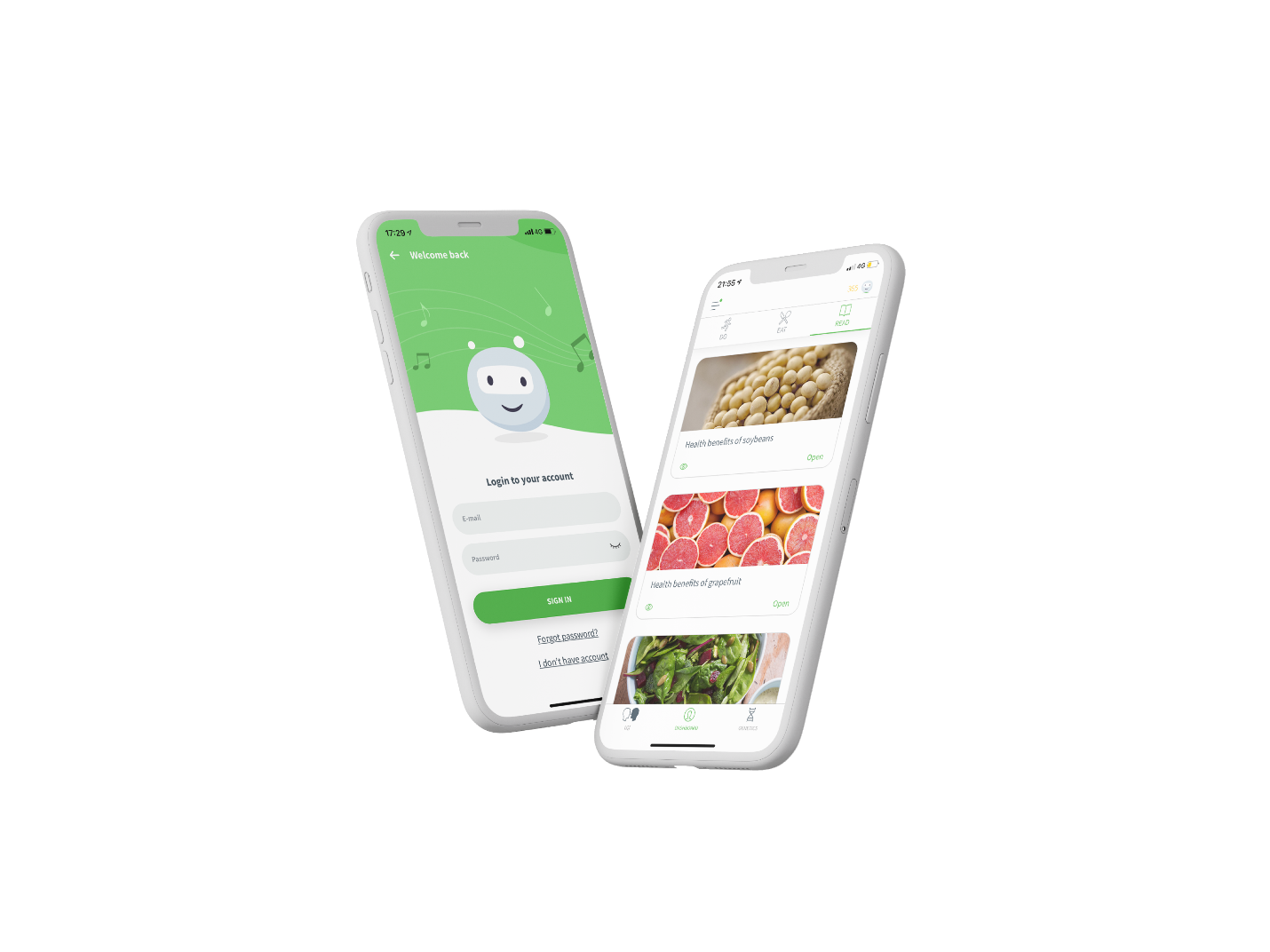
Since health is even more crucial during the COVID-19 crisis in the UK, IamYIAM has extended free access to SYD to all working from home, patients, and emergency staff. The demand for SYD has increased during this period, with most users selecting the COVID-19-specific goal in the app, providing them with daily recommendations to keep physically and mentally fit while confined at home.
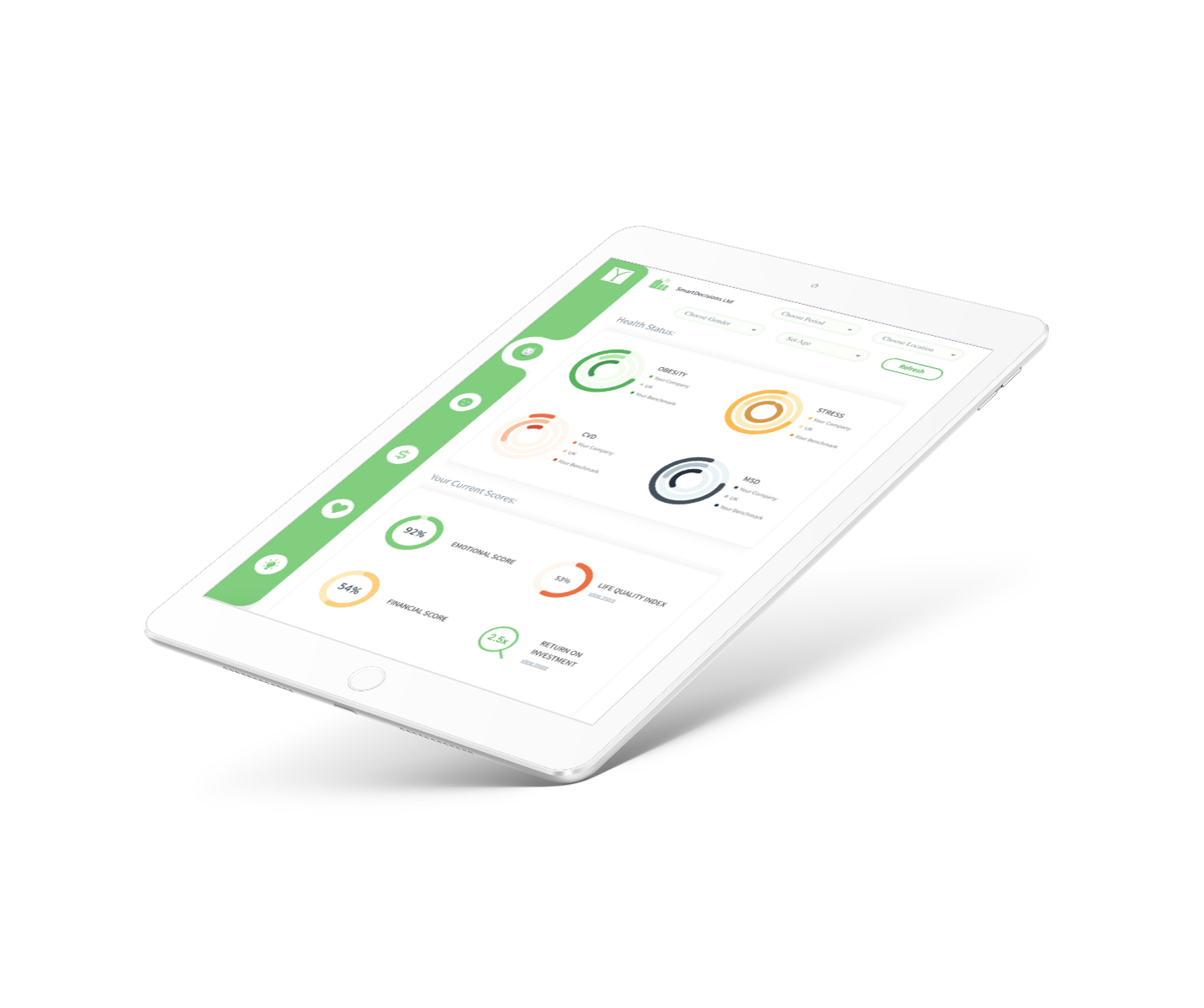
SYD provides a real-time anonymised population dashboard of integrated human health and predictive analytics for organisations to develop strategies to optimise quality of life for their employees, patients, clients, etc. The dashboards are tailored to meet the information needs of the organisation and provide data for wider population health management systems.
Current Health
Current Health aims to build a future where healthcare is delivered to patients before they even fall ill, working towards proactive and community-based rather than reactive healthcare.
Current Health offers advanced remote patient monitoring platform using proprietary machine learning algorithms, with ICU-level accuracy at home. With virtual video visits on an all-in-one wireless wearable device, they have made continuous and passive monitoring of core vitals possible. Their solution seamlessly integrates with an ecosystem of peripheral products to track temperature, blood pressure, and continuous glucose, among others.
Current Health’s solution even offers the capability to monitor patients based on hospital-controlled protocols and send fully-managed kits to a patient’s home. These work together to help the healthcare system reduce COVID-19 readmissions, increase reimbursement, and improve the experience of both patients and healthcare workers.
Tapping on their expertise in Artificial Intelligence (AI), they plan to roll out a next-gen wearable device later in the year that will be the smallest in the world.
Inavya
Avatr FRIEND is the brainchild of the London-based startup, Inavya Ventures Ltd. Their unique technology harnesses the power of AI and machine learning, enabling doctors to give their best care, and empowering patients to take control of their health.
Avatr securely pools multiple sources of data to create a digital representation of a patient, and has patient insights on hand whenever the doctor requires it. It maintains real-time, permanent connectivity between the doctor and patient.
When COVID-19 hit, Inavya worked to develop enhanced features that not only provided COVID-19 symptom monitoring and alerts, and data analytics tracking comorbidities like diabetes and hypertension.
It also enabled video conferencing between patients and doctors, and included a feature that allows patients to keep in contact with friends and family via tele-conferencing to maintain safe distancing.
The European Commission has just awarded AVATR a ‘Seal of Excellence’ in recognition of the high quality of innovation as well.
Huma
British healthcare tech startup, Medopad, recently rebranded as Huma, tweaked their remote patient monitoring (RPM) platform to specialise in COVID-19, and is making their technology available for all NHS Trusts, as well as global healthcare providers.
Designed to help monitor ill and at-risk patients, the specialised platform enables healthcare workers to track patient data and symptoms progression, and flag patients with worsening symptoms, both in and out of clinical settings. Patients can use a corresponding app to securely share personal health data such as temperature, respiration rate and heart rate.
During the crisis, Huma’s solution allows hospitals to continuously monitor and engage with their existing patients remotely, without exposing them to elevated risks of COVID-19. In collaboration with their global partners, like John Hopkins, Huma is also working on clinically validating digital biomarkers to identify individual risk for COVID-19, and to monitor respiratory symptoms and progression.
AMPLYFI
AMPLYFI developed the ‘Coronavirus Gateway’, a public search engine connecting to leading information sites, to create a one-stop shop for the best available information on the pandemic.
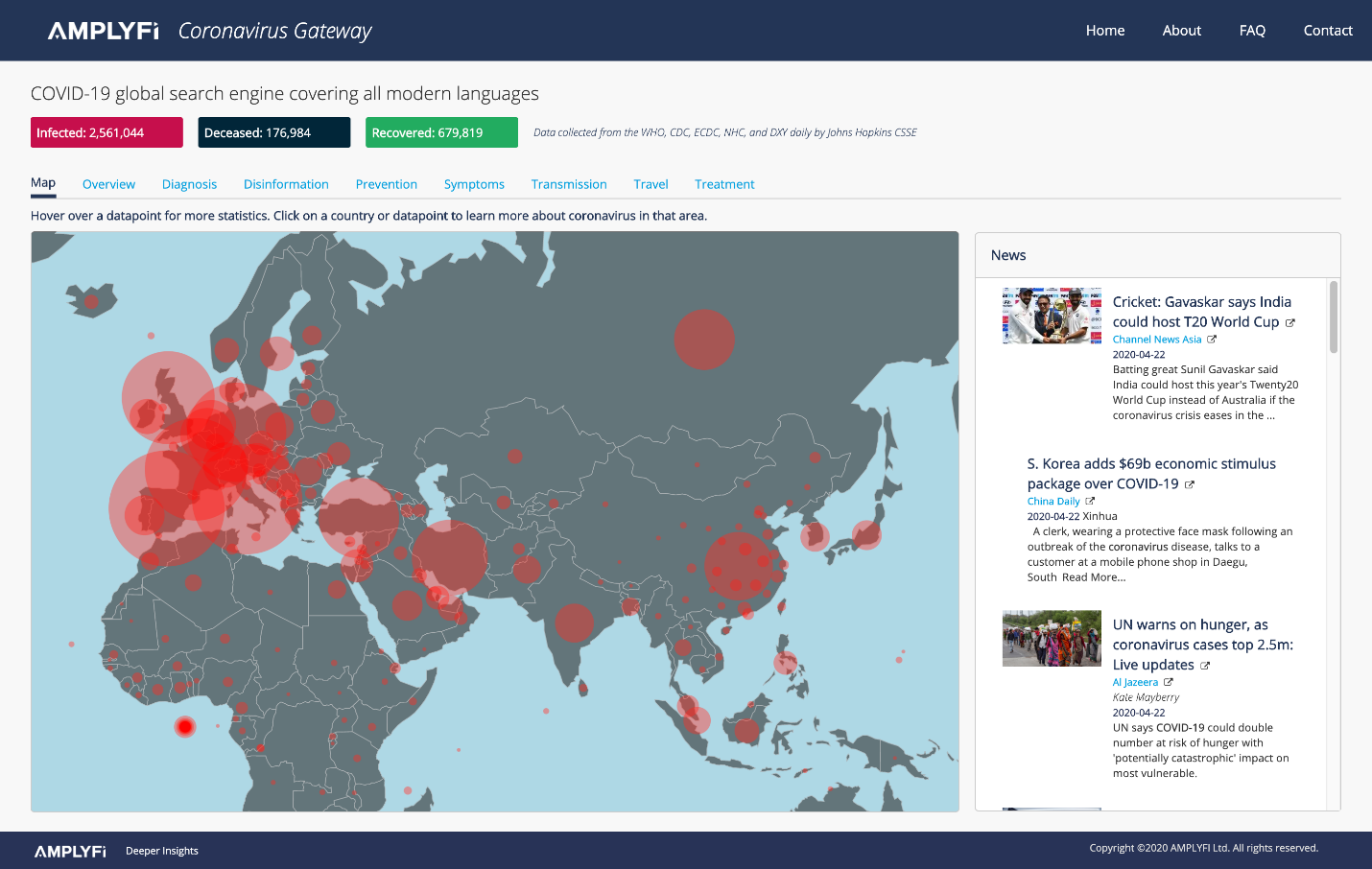
Coronavirus Gateway connects to a wide variety of leading news, government, academic, and other renowned sources around the globe to provide the latest and most relevant information as possible.
Statistics displayed are all verified and exclude reported unofficial numbers from some locations. Since its launch in March, the gateway has been visited around 20,000 times by users from over 80 countries.
The global map shows the confirmed status of cases around the world, and hovering over the graphic shows the official statistics for each specific location. Clicking on a location on the map shows more specific content relating to Diagnosis, Prevention, Travel, etc. The Topic Wheel enables users to drill down further to explore specific areas of interest.
Ensuring the right information is easily accessible will combat the fake news surrounding COVID-19, empowering the people to do what’s right.
Unmanned Life
Although robots have shown their worth in the battle against COVID-19 and in the prevention of future pandemics, many of these systems still lack scalability and flexibility. Unmanned Life’s Autonomy-as-a-Service software platform enables fully autonomous robotic swarms.
Unmanned Life’s platform is a single management interface with a centralised control platform, integrating robotic systems with different capabilities and functions into one autonomous robot team.
The central control platform, which eliminates the need for multiple operators, acts as the brain of all connected robots and allows them to work together to achieve specific goals as one autonomous robot team. This enables autonomous robot teams to assist governments, law enforcement agencies, and healthcare workers in the battlefields against COVID-19.
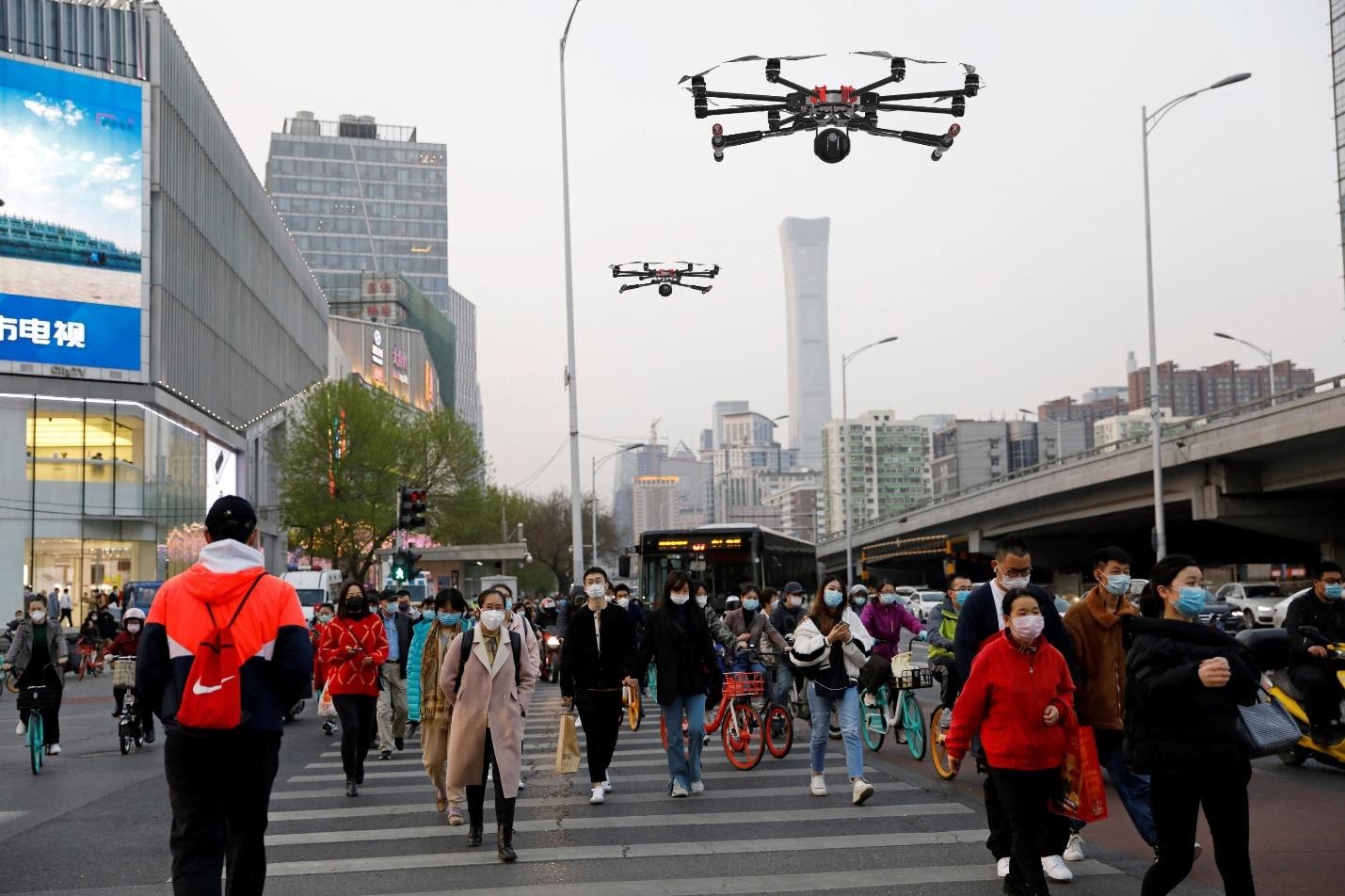
Unmanned Life’s solution offers assistance in enforcing lockdowns and social distancing, making public announcements, tracking people with fever, disinfecting indoor and outdoor spaces, and carrying out last-mile deliveries of food, medicine, and other goods to those in isolation. It also helps in the transportation of test samples from test centres to hospitals, and urgent medical supplies to test centres.
DeepMind
DeepMind is an AI research organisation made up of scientists, engineers, and machine learning experts. In support of the global scientific community’s research effort to understand COVID-19 better, DeepMind released structure predictions for six proteins associated with it.
DeepMind’s AlphaFold deep learning system generates 3D protein structures based solely on genetic sequences. They are said to produce the most accurate 3D models of proteins available, which is a huge progress in a core challenge of biology.
Their team focused specifically on modelling target shapes from scratch, without using previously solved proteins as templates. These protein structure predictions have matched experimentally-determined protein structures with a good degree of accuracy, but more work is required before this system can have real-world applications.
DeepMind started in London, and has offices located in Canada, France, and the US, and is constantly collaborating with interdisciplinary experts to advance the state of the art in AI research and help solve other scientific challenges.
Preparing for the future
With the lessons learned from COVID-19, these ten future-ready startups—and many others like them—are in a good position to help us better prepare for the next emergency that comes our way. The future of the healthtech industry is promising, and we will be exploring more of these trends at SWITCH 2020.

